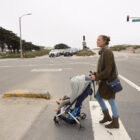See our November 2024 SF Voter Guide for a nonpartisan analysis of measures on the San Francisco ballot, for the election occurring Nov. 5, 2024. The following measure is on that ballot.
Proposition I would improve retirement packages for 911 call dispatchers, as well as nurses who transitioned from temporary to full-time staff positions, in an effort to attract more people to those city jobs.
The measure could help fix persistent staffing shortages and improve emergency and health services in San Francisco, supporters say.
“When we look to the future, we have to ask ourselves, who’s going to answer these calls?” said 911 dispatcher Valerie Tucker, referring to emergency phone calls, at a July public meeting about the measure. “Currently, we’re not even replacing the members that are leaving due to retirement.”
Listen to a summary of what this ballot measure would do.
Support
Proponents argue that if Proposition I increased recruitment and staffing, City Hall could reduce expensive overtime, saving taxpayers money.
The measure is endorsed by the full Board of Supervisors and Service Employees International Union Local 1021, the chapter that represents nurses and emergency dispatchers.
Sign up for our free weekly newsletter for reporting on local politics in San Francisco.
Opposition
The Libertarian Party of San Francisco opposes Proposition I. The city’s government is already too large, and spending more money on public employees while expanding their ranks would increase the burden on taxpayers, the party says in its argument against the measure.
What it would do
Registered nurses working for the Department of Public Health can take shifts on a temporary basis, as needed, or they can be full-time city employees with pensions. The more years that employees work, the greater their retirement packages are.
When a temporary nurse transitions to a full-time position, the process can take months or even years. In the meantime, they are still treated as temporary, meaning their work hours do not count toward retirement benefits.
Proposition I would allow registered nurses who made that transition to then pay the city to retroactively include up to three years of prior temporary work for the city in calculations of their retirement benefits.
Proposition I would rectify a long-standing inequity: Today’s nurses, most of whom are women, are the only city workers who cannot buy back pension time when they become permanent employees, said Heather Bollinger, a registered nurse and president of the chapter that represents them at SEIU Local 1021.
Proposition I would also switch 911 dispatchers, their supervisors and related staff to better retirement plans on Jan. 4, 2025, though the new plans would be inferior to those for other emergency responders like firefighters and police officers.
Cost
The cost to implement the measure would be between $3.8 million and $6.7 million in the first year and increase over time, according to estimates by the controller’s office.
The city’s expenses would depend in part on how many nurses participated. As of July 2023, there were 1,400 registered nurses working for the city who would be eligible to buy back work credit, the controller’s office said.
Costs tied to the retirement packages of emergency call staff would rise with other payroll expenses, including hiring new employees or giving people raises. The city employs 175 emergency dispatchers and related staff, the controller said.
Campaign finance
As of Oct. 7, the “Yes on I” campaign committee had raised $110,000, entirely from SEIU Local 1021, according to data from the San Francisco Ethics Commission.
No group opposing Proposition I had reported fundraising activity to the city.
History and context
A nationwide shortage of registered nurses, as well as long hiring and training processes, have created vacancies among San Francisco’s nurses in recent months. That has fueled burnout, which in turn threatens to cause more vacancies. Dispatchers have faced similar challenges.
“This is not something that’s unique to San Francisco,” said District 11 Supervisor and mayoral candidate Ahsha Safaí, who co-wrote Proposition I, at the July public meeting.
“But I can tell you, talking to nurses, talking to 911 operators,” Safaí said, “they are at a breaking point.”
Between 20% and 25% of dispatcher positions were vacant as of April, according to data that Safaí obtained from the Department of Emergency Management, which employs dispatchers. The measure’s authors say the vacancies have caused longer wait times between when someone calls 911 and when a dispatcher picks up. The department aims to pick up 95% of calls within 15 seconds, but that rate was 90% in January 2022 and 73% in February 2024.
And an estimated 169 registered nurse positions were vacant as of March, according to data that Safaí obtained from the Department of Public Health. Those vacancies have caused the quality of care to drop at Zuckerberg San Francisco General Hospital and Trauma Center, a public hospital, according to a 2023 Civil Grand Jury report.
The city is filling staff shortages by hiring temporary nurses, through corporate contractors, who are paid 14% more than their full-time counterparts would be, Safaí and other Proposition I supporters say.
By letting nurses put their prior work hours toward pensions, Proposition I could draw people away from private hospitals and toward full-time positions with San Francisco.
“Private hospitals can provide better salaries and benefits and work conditions but they cannot compete with the city’s retirement package for employees,” said Esther Lee, legislative aide to Safaí.
Votes needed to pass
Proposition I requires a simple majority of “yes” votes to pass.
Click here to return to our full voter guide.










